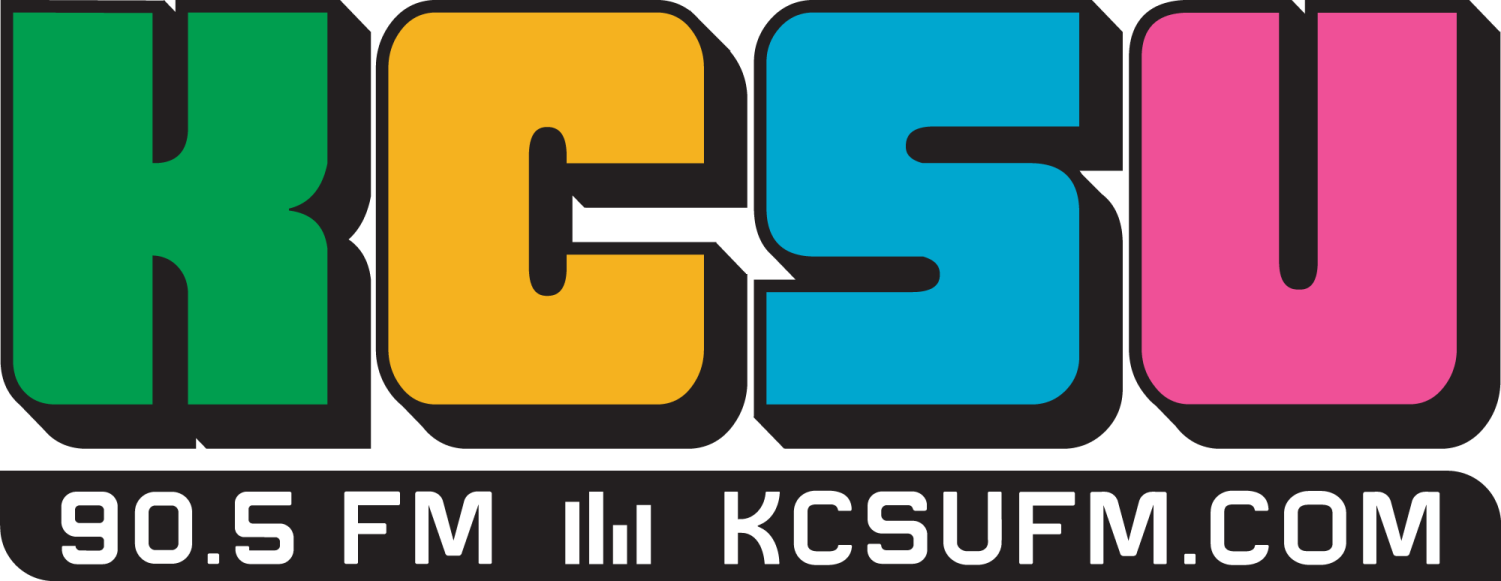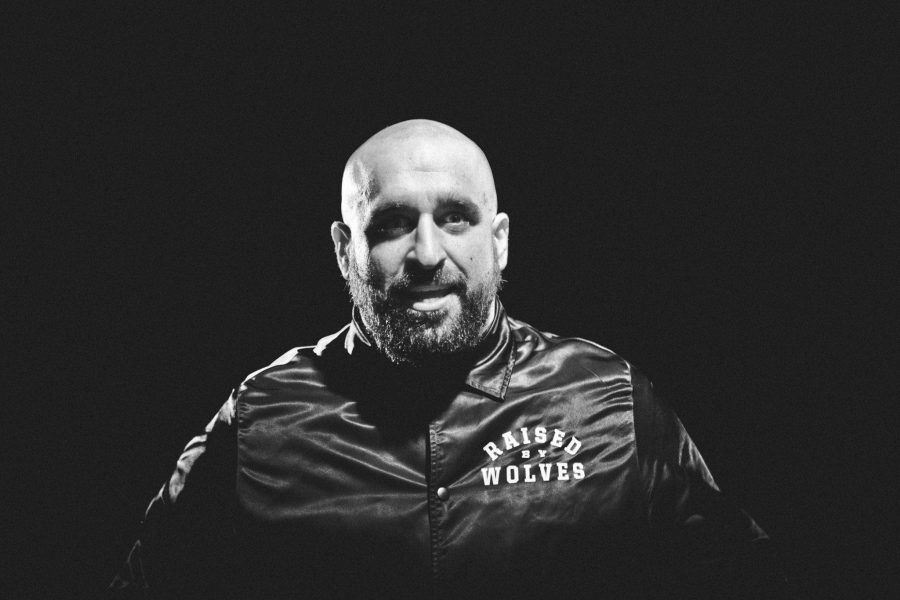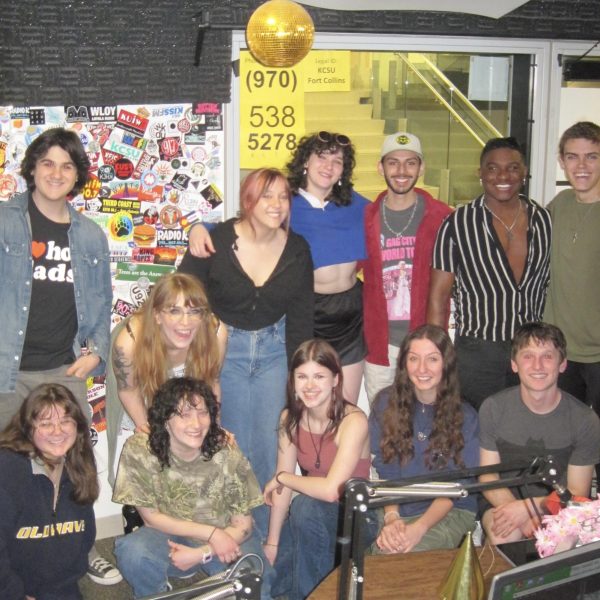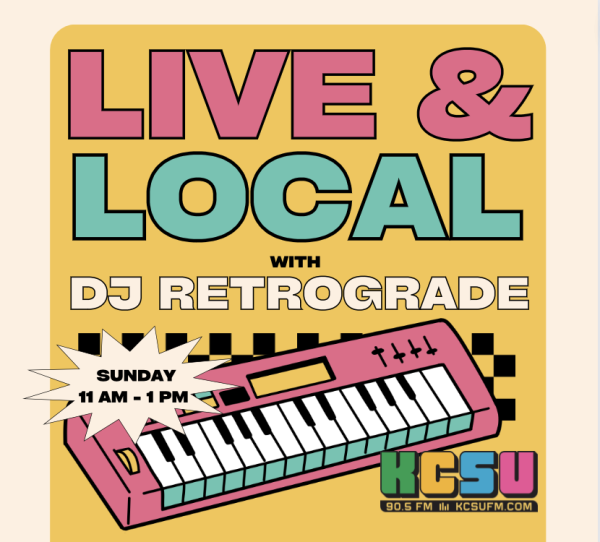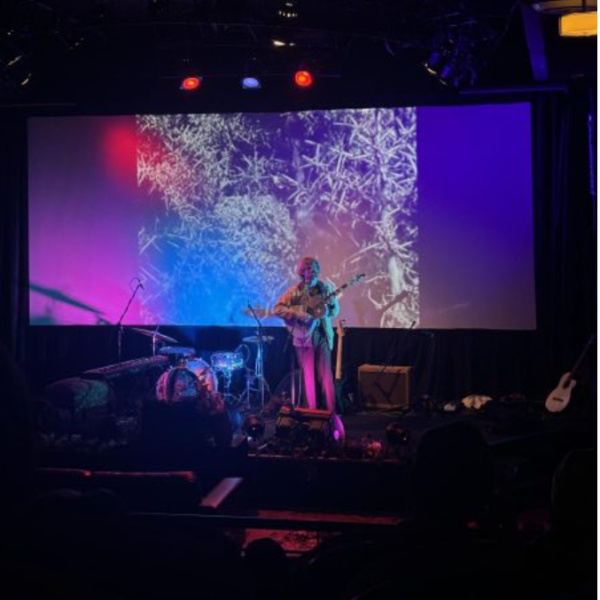B. Dolan Interview
February 27, 2015
Editor’s note: KCSU does not support Micheal Jackson or James Brown, their labels or their actions.
Providence, Rhode Island rapper, B. Dolan has been performing for over fifteen years. He is now headlining his own tour with support of Denver’s own Rubedo and Wheelchair Sports Camp. Coming with a new live set and backed with his new mixtape release, House of Bees Vol. 3, he plans to blast his beats all the way to the west coast and then down to SXSW. This tour starts this Thursday in Denver at the Walnut Room and then he will come up to Fort Collins on Saturday for a FREE show at Illegal Petes. I got to talk to him over the phone as he prepares for the tour.
You’re doing a live set now for this tour. How is that different from your previous set?
I mean it’s just a bigger sound. It’s a much bigger sound. And now that I’ve spent a lot of years opening for other acts on the road I’ve been lucky to be brought out with, you know, Sage (Francis) and Atmosphere and Buck 65 and lots of other big acts. I’ve got enough albums under my belt and enough tours under my belt that it’s time that I can headline. And so we’re trying to build the whole show up and put more back into the show. So that we are bringing more show than ever before. A live band is a great way to do that because it physically takes up more space. You just can’t really match the energy of a live band and we spent a couple years putting this set up together. I’m rehearsing with Rubedo now but, it’s a set up that has had, already, three other incarnations with different bands. It’s kind of like a modular set up that we can take apart and put back together depending on… You know, like, Rubedo’s opening from here, but when I was in the UK there was this [band] called WarrenPeace that was opening for me and we’d add a drummer and that would become our live band. It’s kind of a complicated set up, but we’ve taken a lot of care so it doesn’t just sound like a rock band playing hip-hop beats. In a lot of cases, like the original samples that you associate with the song are still there on a backing track. But the bass is being handled by this beautiful Moog synthesizer that makes the whole venue shake when it plays bass notes and sh*t. A live drummer is there adding the punch that only live drums have, on top of the snare that you associate with “Marvin” or “Film The Police” or whatever. So yeah, I’m really excited about it. And this is kind of the first time that we are properly bringing that out in the US. We did a short tour a little while ago with two hardcore bands.
Really? That’s awesome!
Yeah man, we f*cking went off. We held the attention of a hardcore audience. (Laughs) We had them throwing their f*cking hands in the air and, like, doing call and response sh*t. So I knew it was time to bring it out.
Your House of Bees trilogy are considered mixtapes. How do these projects differ from actual studio albums that you have put out?
The only real difference… The first House of Bees was something that Buddy Peace put together. He remixed some of my more hip-hop stuff from my debut album The Failure. He remixed some of that stuff and then just sent me some beats but from then on we kind of started making the House of Bees, from Vol. 2 on, as more of a new album. But the main difference is samples. Because of sample laws and because of who we are as indie artists… I mean because of who anyone is. Like if you listen to almost any rap album, you don’t hear samples like you used to hear. Like if you listen to Buhloone Mindstate or Paul’s Boutique or an album with 300 samples on it, which have been carefully interwoven. Because you can make that but then to sell it is almost impossible. Even to give it away for free. It kind of opens you up to some dangers of being sued. And unfortunately that’s really inhibited a lot of rappers and producers that want to… Because of who we are and how we make music we have ideas like that. Like if you came up in hip-hop, you know, like flipping the song or flipping the sample, that’s like an intrinsic part of the culture that is just how you think creatively. So when I think of something like “Film The Police,” that is clever because it’s very specifically because you use the beat from “F*ck The Police.” All of hip-hop is about that and re-contextualizing that stuff including samples and including other rap songs. And to do that now, who can afford to clear that James Brown sample or that Mavis Staples sample? So the House of Bees stuff came about because we were just like, “F*ck it man, we want to make these songs. Let’s make the songs and we will just put it out for free. We won’t put it on Itunes. We won’t send it out to out distributor. It will be a more low-key, under the radar release… And hopefully, we won’t get sued” But there’s no difference in quality. I don’t work any less hard on the songs that I do on the official songs. It’s mostly just a sample issue.
Then going back to “Film The Police.” That song has had more of an uprising in the past year because of the current events that have taken place. How do you think that song affects protestors or people that are fighting for their cause and better social rights?
I think that it was an idea whose time had come a little while ago. It continues to become more and more relevant, unfortunately. But it was something that came out of the shooting of Oscar Grant. That was the catalyst for writing it. At that time we were just talking about cell phone videos of Oscar Grant being shot while unarmed by BART police and those testimonies. And the fact that that was able to go viral online was this powerful new weapon. I was talking to an activist friend that was involved with Copwatch. Which is an organization that trains people to film the police and the community and the places where they live as a way to deal with police violence. And we were just talking about what an important idea that is. So yeah, we had the idea to make that song. By the time it was ready to come out the Occupy Movement was jumping off and there was lots of footage on the news of Iraq War Veterans and white kids in parks getting beat up by cops. And that kind of propelled the initial little mini-viral nature of the song. And now it’s come up again with Ferguson and with all that stuff. And I hope that it’s a practical reminder for people. That’s the most I hope for. The fact that became a hashtag. The fact that I see a rapper named Vic Mensa who just made his own “Film The Police” shirts… He probably has never heard my song but someone probably said to film the police and he thought it would be a good idea to put it on a T-shirt. (Laughs) Like the words have just taken off. That hashtag has taken off and has a life of its own now. Which is great to me because it’s useful. I don’t think it’s the be-all end-all. I don’t think that filming police is the ultimate way that we’re going to win and the way we’re going to stop police abuse. I think the fact that you see people protesting at the rate they are and with the ferocity that they are right now has to do with filming the police. I think that the fact that the Internet and our social media and ability to report what we see around us. It’s not that police are beating up more people than they ever have before or killing more on our home streets. This has been going on forever. My first protest ever was in New York City in 1999 after the NYPD murdered Amadou Diallo. It was crazy. It was an epidemic of unarmed black men being killed by the NYPD and nothing happening to them. So this is not new sh*t that’s happening. It’s just that now we have these tools, now we have this consciousness of social media. And now we are able to report them to each other and the momentum of outrage is kind of building and things don’t seem like isolated incidents anymore. We’re kind of recognizing what’s going on.
httpv://www.youtube.com/watch?v=hyT1buoyTnY
For people who haven’t heard you before, how would you describe your genre of hip-hop?
(Laughs) Ugh… I don’t know. That’s a hard one. Because I’m influenced by a ton of different hip-hop. And I make stuff that ranges from what people would consider spoken word all the way to just agro-f*ck sh*t up hip-hop. And then there’s political stuff and then there’s emotional stuff. The time I was coming up and getting excited about rap, there wasn’t really any distinction at the time. I was just thinking about that because I was watching a video of The Source Awards and just remembering a time when we had no real consciousness of “underground” as a concept. Like there wasn’t really such a thing as underground rap. Like if you listened to Biggie’s first album or Illmatic, you would hear that record now and think that’s underground rap if you didn’t know what that was. But that was the biggest rap record in America. And every rap fan loved that record. So, I don’t know, like all those weird sub-genres… It’s a marketing tool or a way to sell people what’s familiar to them. And I generally don’t jive really well with that stuff. (Laughs)
What made you start performing?
Uh, sh*t man. My grandmother did. She used to give me a wooden spoon and put me on the kitchen table and sing Michael Jackson songs. (Laughs)
Who is Bombzo the Clown?
That’s something I was doing during the Iraq War and during the Bush presidency. That was like my f*cked up performance art response to the Bush presidency. The stuff I was seeing on TV was filling me with awful, awful feelings and the way it manifested itself was Bombzo the Clown. Who was this awful, awful character that was just this bad guy wrestler, pro-war, antagonistic clown in a bloody butcher’s apron. Who would crash rap shows and just perform a poem called “Bombzo for Baghdad” but also just kind of rile up and insult the whole crowd. It was a lot of fun. No one knew who I was at that time. This was before people really knew me as a rapper. And Sage would let me just crash his concert just to see what would happen. He would finish “Makeshift Patriot” and I would start heckling him from the crowd. He would challenge me to come up on stage and I would go up on stage. He would give me the mic and I would just take over for four minutes. And it was crazy, man. I’ve had people throw sh*t at me, people try to climb up on stage and fight me, and I’ve had people just weep. People just crying. And I was young at that time and I was very… (Laughs) I don’t know. I guess I’m still as radical in my thinking but I was much more radical in my approach. And I was still coming to terms at how I felt about audiences and the act of performing. Especially political art is something that I’ve wrestled with in my life. Like what is the nature of that and what is it? Like is it useful? Is it useless? And how do I feel about that and how do I fit into that? This was before “Film The Police” and before I had decided that maybe there is a kind of political art that can serve a real purpose in the world. This was a, kind of, more cynical version of myself that was like, “Yeah you want to make political art? Then paint yourself like a clown. Get on stage.” Because it bothered me that at raps shows, kids would show up and buy a T-shirt with a political slogan on it. And pump their fist to a political anthem but then a very small percentage of them would show up to do actual social justice work. And so I was wrestling with that stuff and how I felt about that. So I had to antagonize people and rile people up and fight them. (Laughs) So yeah, that was Bombzo.
What is your favorite song off of House of Bees Vol. 3?
Volume 3? Sh*t. Man, I like them all. “The Devil and Jack McCarthy” was one that’s really close to my heart because that song was literally 5 years in the making. Jack McCarthy was this spoken word poet that inspired me to try spoken word. I saw him perform in probably 1998 in Providence in a little bar called Nick-A-Nee’s. And he was like an old dude in his 70’s or his 60’s at least that was competing against these young slam poets who had these, kind of, corny slam poetry styles. But he was this old man that would just lean up against the pool table and just talk. And he had such a compelling way… And was just an incredible poet. But it was just real honest work. So he was a hero of mine and made me want to try spoken word and the reason I did it. And I competed in Providence later and we just kind of became friends. I moved to New York, moved back, and started performing myself. But when I came back I met him again. And he would make me feel like a fan boy sort of. No one knew who the f*ck this dude was except for me and the rest of the spoken word community. Then in 2010 he happened to be traveling through the region and stopped by my studio. So we recorded that poem. Jack passed away a couple years ago and I had that a cappella so I was trying different stuff. Eventually in order to properly pay tribute to that… That man and that recording, we just created this really ambitious, crazy, Ennio Morricone, western style music behind it. We recorded live violins, we recorded upright bass, we recorded acoustic guitar just to make that backing track that I think is one of my favorite things I’ve ever helped compose or arrange. But yeah, I’m proud of the whole album but that particular one hits close to home.
How does slam poetry and spoken word affect your music?
I think it was useful in that it teaches certain skills in regards with how to speak intimately with an audience. In a way that maybe rap doesn’t. And that gets translated to my music at times. Like I can communicate a closeness that rappers might have a harder time communicating.
Okay, weird question. Who is your favorite Teenage Mutant Ninja Turtle?
I think I really like Donatello for some reason. I don’t know why or remember anything about his personality. I think it’s because he had the big long stick and that was something I had access to. Like we didn’t have little scythe things and we didn’t have nun chucks, but that dude just had a big long stick. And we just got a big long stick and me and my friends would go and beat the sh*t out of each other. (Laughs)
What advice would you give to any aspiring artists?
QUIT. DON’T TRY.
Why?
(Laughs) Because that’s what everyone told me. And if you’re going to do it, then you’re going to f*cking do it. People telling you to quit is just going to inspire you to f*cking do it harder. I feel like if you have a plan B, do that. I mean I can’t speak for the rocket ship to super-stardom but if you’re going to go about it the way I’ve gone about it, it’s going to require incredible amounts of sacrifice and dedication well beyond what you would think your limits are as a human being. So if you have a plan B you should just do that. And if you can’t quit then… You don’t need advice. (Laughs)
Is there anything that you would like to say to your fans?
I have just finished, literally today, the official LP that I’ve been working on for five years. It’s the most ambitious thing I have ever done. It features incredible collaborations that people are going to lose their sh*t about when they hear. We’re looking at a mid-summer release. We’ve got a really intense, exciting year of touring lined up that’s starting now. Starting in Denver this week. But we’re going to start bringing those songs out and there’s going to be videos and just really, really exciting stuff coming out this year. So yeah, just stay tuned! You can follow along at Strange Famous and my website.
